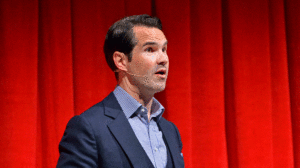My colleagues and I filed into the vice president’s office at the publishing house where I worked, crowding around a television that was turned to ABC. The year was 2005. The mood was giddy, as if we were about to witness a public execution — which, in a way, we were.
James Frey, author of the bestselling memoir A Million Little Pieces, had been exposed as a fraud. Oprah Winfrey, formerly his biggest champion, was about to confront him live on national television. And she was pissed.
“I’ve struggled with the idea of it,” Frey said, in response to a question about the famous and then-allegedly fallacious scene in his book in which he receives a root canal without anaesthesia. Oprah snapped. “No,” she said, icily. “Not the idea of it. The lie of it.”
Frey, whose book was published in 2003, was the most notorious literary fabulist of the moment, but hardly the only one. The Noughties were rife with fabricators. There was Margaret Seltzer, who had lied about being a biracial gang member in South Central Los Angeles. There was J.T. Leroy, a trans sex worker, drug addict, and author of semi-autobiographical novels — who turned out to be the imaginary alter-ego of a middle-aged woman named Laura Albert. There was Herman Rosenblat, whose Holocaust memoir Angel at the Fence was cancelled when it turned out that, though his story of surviving the Buchenwald concentration camp was true, the improbable tale of the little girl who saved his life by throwing apples over the camp’s barbed wire fence, and later became his wife, was not.
All very different narratives, and yet, with a common thread — one that at the time spurred a fiery debate about memoir as a genre, and the proliferation therein of what could only be described as trauma porn.
Memoir offers all the enticing horror of sexual abuse, of graphic violence, of watching a man strapped down and brutalised by a dentist — while offering the upright reader plausible deniability. He consumes these books not because he finds such things titillating but because he cares. Audiences want to read about pain and suffering, abuse and exploitation; you were supposed to feel bad for the people who had written these books, while also feeling good about how bad you felt.
When Oprah angrily told James Frey that he had “betrayed millions of readers”, it was this crucial contract he was accused of violating. Because if these stories weren’t true, then the people who were thrilled by them weren’t empaths, but voyeurs.
Today, the collective horror at Frey’s deception feels like the product of a more innocent time, particularly when compared with the muted response to last week’s unmasking of his contemporary equivalent. Comedian and television personality Hasan Minhaj, an alumnus of The Daily Show, built his career on stories of the persecution he had faced as an Indian, Muslim son of immigrants in a post-9/11 America. But as outlined in a devastating report by New Yorker writer Clare Malone, his most popular material contained key omissions and barefaced lies.
The FBI informant who infiltrated Minhaj’s Muslim community and then reported his mosque to the authorities? Minhaj never met him. The hospitalisation of Minhaj’s daughter after someone mailed him an envelope full of a white mystery powder that could have been anthrax? Never happened. And the high school ex-girlfriend who accepted Minhaj’s invitation to prom, only to jilt him on her doorstep for racist reasons while her new (white) date slipped a corsage on her wrist? She had actually turned down Minhaj several days earlier, and this doorstep moment — upon which Minhaj more or less built his career — was a complete fabrication.
Much like Frey, Minhaj’s popularity centred on his suffering. His work was understood to express the crude, unvarnished and sometimes darkly funny truth of what it is like to be a brown-skinned man in a racist America: white liberal audiences treated him as a sort of mascot for the oppressed, while the culturati lauded him for speaking truth to power. Here, as Slate writer Nitish Pahwa puts it, was “an Indian Muslim, hosting his own show, taking the country to task on his terms, terms that had long been absent from the white man–dominated industries of stand-up comedy and late-night TV”.
But things are a little more complicated when the fabricator is telling tales on the stage rather than the page. It is understood that for comedians, the question of truth, as in authenticity, is something separate from what is true, as in accurate. Comedians will do anything for a laugh, lying included, and everybody knows this — even if the precise ethical boundaries of untruth are sometimes the subject of debate, including by comedians themselves. An essay from 2017 by screenwriter and stand-up David Misch, which tackles this very question, includes a prescient little frisson:
“I agree that the idea of authenticity in a stand-up’s persona is bullshit, but subject matter is a different matter — specifically, when a comedian moves from personal observations to cultural critiques. Wouldn’t we feel betrayed if we found out that the political routines of … Samantha Bee, Trevor Noah, and Seth Meyers (now) didn’t reflect their beliefs? Being Muslim-American is central to Hasan Minaj’s identity as a stand-up — wouldn’t we feel differently about him if it turned out he was Baptist?”
Misch presents this as a rhetorical question, and it is — but only because of the kind of comedian Minhaj is, which is to say, the kind who is not particularly funny. Consider the top YouTube result from his Netflix special, Homecoming King, in which he talks about the harassment his family endured after 9/11. There are ripples of laughter here and there, but it’s only when he stops joking and starts preaching — “I have the audacity of equality!” he says — that the audience explodes like they’re at a tent revival.
Of course, this is as intended. Minhaj isn’t a make-you-laugh-til-your-face-hurts comedian; he’s a Daily Show guy, a pundit with a slightly-better-than-average sense of humour, but one that is smug rather than silly. His audience isn’t there to laugh so much as enjoy the sensation of moral authority with a wink and a titter. And while Minhaj’s material works well enough on television, onstage it translates to something that is less stand-up comedy and more performance memoir.
Here, Minhaj is following in the footsteps of performers such as Hari Kondabolu, John Oliver, Seth Myers, and, of course, Hannah Gadsby, whose Netflix special Nanette was more trauma porn that explicitly scolded its audience for showing up expecting to laugh. Critics at the time suggested that Gadsby had broken some final frontier, effectively severing the connection between comedy and jokes. Maybe laughter had had its moment; maybe what we needed from comedians now was some moral instruction in what isn’t funny. Maybe what we needed was to feel bad — and to feel good about how bad we felt.
Under this new contract, drawn up amid the creeping identitarianism of Trump-era art, it is not hard to see why someone like Minhaj might fall into the trap of not just monetising his trauma, but fabricating it. It is what Jay Caspian Kang called “oppression fantasy”, writing that Minhaj’s fakery represents “another example of how oppression stories — in this case fabricated oppression porn — gets leveraged by upwardly mobile immigrants to mostly advance their careers”.
It is also a familiar dynamic to anyone who remembers the memoir hoaxes of 20 years ago; the type of audience who flocks to see Minhaj today is the same one that made James Frey a bestseller. There is nothing that white educated liberals love more than to slum it in a voyeuristic narrative of someone else’s suffering, all while congratulating themselves on being enlightened enough to appreciate it for the art it is. Inject a bit of racial guilt into the mix, and you’ll dine out for the rest of your life courtesy of the New Yorker tote bag class — at least until one of said magazine’s investigative reporters finds out you’re full of shit.
But today’s trauma merchants are ultimately better off than the hoax memoirists. The days in which audiences responded to lies like this with a sense of outrage and betrayal are over; if anything, the anger today is reserved for the person who interrupts a comfortable narrative with a bunch of pesky facts. Consider what happens, inevitably, whenever some bias-stroking outrage is exposed as a fraud — whether it’s Jussie Smollett, or kids identifying as cats, or a guy allegedly shrieking the N-word at a crowded sporting event. Instead of revising our priors, or even being relieved, we look for ways in which being wrong only goes to show how right we were. So, this story wasn’t true? Ah, well: this country is so racist, or sexist, or full of sexually depraved weirdos who want to secretly turn every kid into a trans-cat, that it could have been true, and that’s just as bad.
Or, as Hasan Minhaj might put it, it doesn’t matter if the story is fake when it is “emotionally true” — which is to say, when it feels like something that could have happened. Needless to say, some people object to this, not least the woman who politely declined that prom invitation as a teenager: she and her family have been receiving death threats for years thanks to Minhaj’s fabrications, a fact about which the comedian is decidedly cavalier. Maybe this girl didn’t do what he described, he says, and maybe what he described wasn’t done to him — but it had certainly happened sometime, to someone, somewhere: “There are so many other kids who have had a similar sort of doorstep experience.”
No doubt this is true, and not just of kids like Minhaj; when I was 17, a more popular boy took me out on a date, then dropped me back at my house several hours later with the dire warning that I couldn’t tell anyone that we were seeing each other. He simply couldn’t risk the humiliation of his friends knowing he was interested in someone like me. His reasons for this had nothing to do with race and everything to do with high-school social dynamics; if I were telling this story as part of a stand-up routine, perhaps I would have to find a way to make him an antisemite.
But despite the fact that the prom story is emotionally resonant with many a teenage experience, there is still something weird — even, dare I say, appropriative — about claiming to have been a victim of something that didn’t happen, let alone making a living off it. On this front, Minhaj has less in common with the comedian who embellishes a wacky story for laughs, and more in common with the TikToker who scammed her followers out of thousands of dollars to treat a cancer she didn’t have. Minhaj has been dining out for years on that doorstep moment. He published it as an essay in Vanity Fair. He’s spoken about it countless times with reporters, never presenting it as anything but a first-person experience. And while it has become a fixture of his comedy over the years, when Minhaj first debuted this material, it wasn’t actually in a stand-up routine, but at a storytelling competition called The Moth.
It is an interesting institution, The Moth: a sort of open-mic night for anecdotes, a performance memoir showcase. It has just one rule: the story you tell on its stage has to be true.
Disclaimer
Some of the posts we share are controversial and we do not necessarily agree with them in the whole extend. Sometimes we agree with the content or part of it but we do not agree with the narration or language. Nevertheless we find them somehow interesting, valuable and/or informative or we share them, because we strongly believe in freedom of speech, free press and journalism. We strongly encourage you to have a critical approach to all the content, do your own research and analysis to build your own opinion.
We would be glad to have your feedback.
Source: UnHerd Read the original article here: https://unherd.com/




